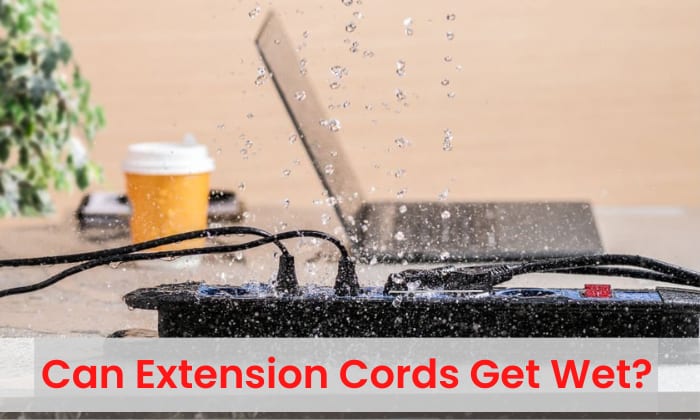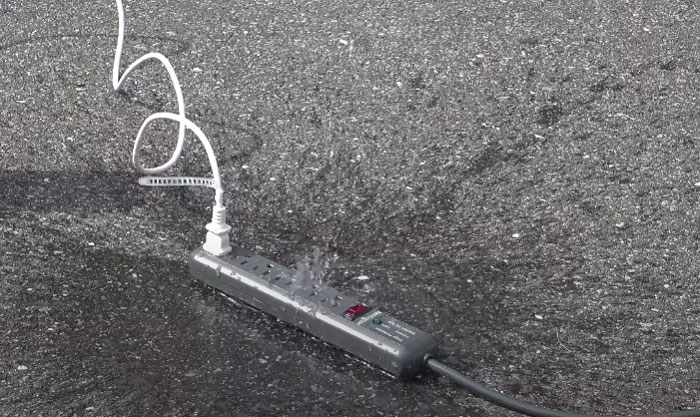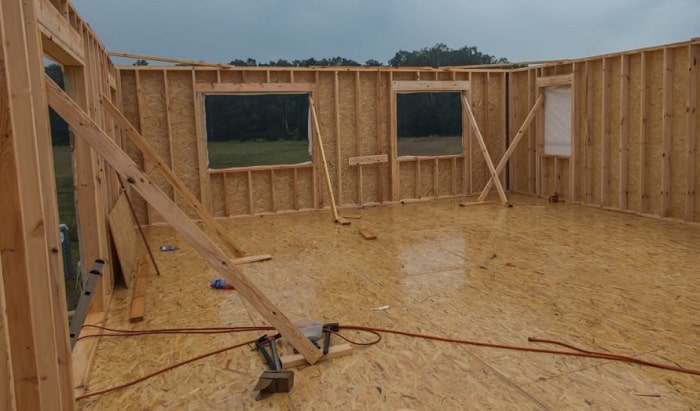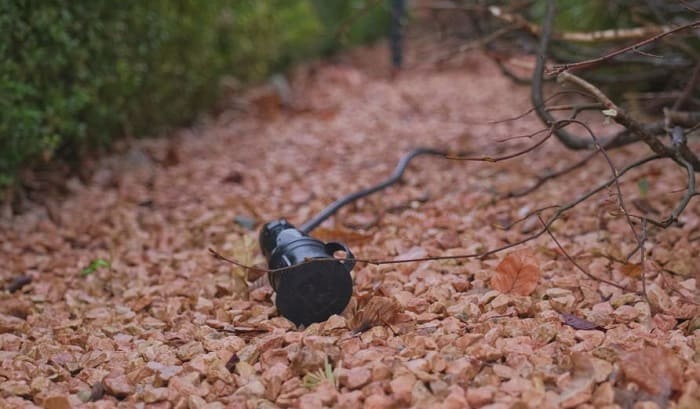Do you need to use an extension cord outside, but there is rain? In this case, you may ask, “can extension cords get wet?”
Yes, they can. Hence, there are some factors that you need to consider when using extension cords outside your home. You can read below to know about these factors and what will happen if the extension cord is filled with water.
Table of Contents
What Happens When Extension Cords Get Wet?
Normally, a disconnected extension cord with a plug left out in the rain won’t sustain any damage. This is because, in this state, it does not contain any circuitry that can be damaged when wet.
Furthermore, if the extension cord is connected to a GFCI outlet, the circuit will immediately shut off once it contacts water. On the other hand, it can be extremely dangerous to touch a wet extension cord linked to a non-GFCI outlet.
This is because electricity will continue to flow and energize your devices, even when they are rained on. Therefore, you can get electrocuted by accidentally touching the wet part near the electrical connection.
That said, when your extension cord gets wet, don’t panic. Here’s what you need to do.
Things to Do When Your Extension Cord Gets Wet
- Disconnect it from the Power Source Immediately
The first thing you need to do when your extension cord gets wet is to disconnect it from its power source. However, ensure that your hands are insulated before you unplug it. Then, you can disconnect all devices linked to the extension and go to a dry area with your extension cord.
- Dry Your Extension Cord Thoroughly
The next thing you need to do is to dry the cable. Shake it slightly to remove excess water, and wipe it using a dry cloth. Using a hair dryer with a low temperature could also speed up drying. Once you’ve got most of the moisture out, let the cord hang for a few days so that it dries completely.
- Test it Before Using it Again
Before using the cable again, you should test it first to ensure it is in good condition. I suggest plugging it into a GFCI outlet, waiting a couple of minutes, and seeing if there is heat buildup or outlet tripping. If there is no reaction, your extension is ready for use again.
The Type of Extension Cord That Can Be Used in the Rain
Several extension cords types are available in the market nowadays. However, the only type you can use outside is the indoor/outdoor-rated or waterproof extension cord.
A waterproof outdoor extension cord comes with a thick cover resistant to tearing, direct sunlight, water damage, or even cold weather. Moreover, it has a weatherproof cover or rainproof jacket that is very useful when it rains.
Alternatively, you can also use an indoor outdoor extension cord for safety rain. It also has durable insulation, which, most of the time, is heavy-duty rubber, vinyl, or plastic that is rated to withstand water intrusion. Additionally, please take a look at the most effective solution to protect outdoor extension cords from rain here.
Generally, this type of extension cord has a “W” or “T” indication on its cover, which means water or weather-tight. At the same time, the insulation color is primarily bright yellow, blue, or green, and you’ll also find orange extension cords.
Hazards Associated With Using Extension Cords in the Rain
Since water is a good conductor of electricity, using an extension cord outside while it’s raining may be hazardous. In most cases, if the extension cord has an exposed wire, it can electrocute anyone nearby.
To prevent this, watch out for ways water may come into contact with the electrical connection inside the waterproof extension cable.
- Damaged Insulation
Though outdoor extension cords are known to have strong insulation, they can wear out due to age. In this case, it is a good idea to check the cord’s health before using it.
- Loose Connection
Another way water may come into contact with the wire is due to the loose connection between the outlet part of the extension cord and the device’s power plug. As a result, you may need to secure the connection tightly and cover this part while it is in use.
Using Extension Cords in Wet Weather Properly
Is it safe to use an extension cord in wet weather? The answer is yes. However, there is a proper way to use it that you must follow.
During Use
- Remember to connect your outdoor extension to the nearest GFCI outlet in your home. This provides ground protection for your extension cord, lowering the risk of electrocution.
- Avoid positioning the connection near wet fixtures or areas, such as water spouts and gutters, to reduce the possibility of moisture ruining an extension cord outside your home.
Furthermore, a rainproof cover for the power socket and extension outlet also helps keep water out.
- Lastly, to minimize sudden harm to your device, always turn it off properly before unplugging it. It will prevent unnecessary energy surges that your cable cannot handle.
After Use
After using your extension cord in the rain, you should dry it before storing or using it again. Inspecting the cable is also beneficial in determining whether it is still functional.
Frequently Asked Questions
Is it OK to Leave Extension Cord Outside?
Leaving an extension cord outside your house is not a good idea, even if it is an outdoor extension cord rainproof design. External elements may weaken the insulation, which, over time, may expose the wire and cause electrical shocks or sparks, resulting in a fire.
Furthermore, leaving an extension cable outside can cause an accident if someone accidentally steps on it. In this instance, we should remove our extension cord after usage to avoid tripping hazards and extend its lifespan.
How Do You Protect Outdoor Extension Cords from Rain?
An outdoor extension cord has strong insulation to withstand different weather conditions. However, it needs to be covered to prevent water from coming in.
There are various ways to prevent spilled water on an extension cord. You can use the cling wrap method, which only requires covering the terminal connections with cling wrap. However, if you have a budget, you can purchase a weatherproof cord cover for a more secure and straightforward connection.
Conclusion
Knowing how to utilize your outdoor extension cord properly, especially during rainy seasons, is essential for the safety of everyone. Considering the factors above might be helpful if you want to use cables outside even in wet weather.
I hope this article answers your question of “can extension cords get wet?” Remember that if you notice any damage to your cord, you should not use it again. In this situation, hiring a professional electrician to repair it or purchasing a new one is the best option.
Related:

I am Edwin Jones, in charge of designing content for Galvinpower. I aspire to use my experiences in marketing to create reliable and necessary information to help our readers. It has been fun to work with Andrew and apply his incredible knowledge to our content.




